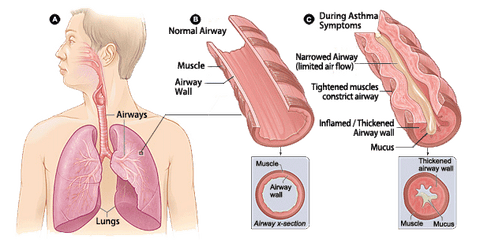How Cold Weather Can Increase Your Asthma Symptoms

If you suffer from asthma, then you know that there is most definitely a connection between this uncomfortable condition and the weather. Just as an arthritis patient can often tell when it is about to rain because they can feel it in their bones, an asthmatic can often tell when the weather is changing because they can feel it in their lungs. With cold weather coming on, it is important to recognize its effect on asthma and learn how to minimize that effect.
What Is Asthma?
Before explaining the link between cold weather and asthma, it is important to make sure you understand what asthma is and how it affects the lungs. Sometimes people confuse allergies and asthma, because they can both affect the airways and lungs. Unlike allergies, asthma does not cause itchy eyes or a runny nose. Instead, asthma affects only the lungs and causes inflammation that makes it difficult to breathe. It is common for people to suffer from both asthma and allergies, since the same air pollutants often trigger both conditions.
Asthma is a chronic, incurable disease that can be life-threatening if the symptoms are severe enough. Although it is incurable, it can be managed with medication and lifestyle changes. Individuals who learn to properly manage their symptoms can lead normal, healthy lives despite having asthma.
What Happens to the Lungs During an Asthma Attack?
During an asthma attack, the airways become very inflamed and sensitive in response to a certain irritant or asthma trigger. When this happens, the muscles in the airways tighten up and restrict air flow to the lungs. In addition to swelling and inflammation, the cells in the airways often produce much more mucus than they usually do, which can cause the airways to become even more blocked. Limited oxygen can cause the individual to become weak, light-headed, and very tired.
In severe cases, if the oxygen flow through the airways is not somehow improved, the individual could die.

What Causes Asthma?
It is not known what exactly causes asthma, but there is a definite link between genetics and the development of asthma. However, there are also other factors that can lead to the development of asthma, including:
- Allergies
- Environmental factors
- Respiratory infections
There are some schools of thought that believe individuals who have allergies are much more likely to develop asthma, and excessive exposure to pollution and respiratory infections are also believed to lead to development of the disease.
What Causes Asthma Symptoms to Flare Up?
Asthma symptom triggers may not be the same for every person who suffers from the disease, but common triggers include:
- Air pollution
- Changes in the weatherPollen
- Physical activity
- Smoking
- Stress & Anxiety
Once you recognize the factors that trigger your asthma symptoms, it is important to avoid them whenever possible. If you live in an area that is full of environmental pollutants, you may want to consider the possibility of moving to an area with cleaner air. Additionally, consider getting an air purifier for your home, as they can help cleanse the air of potential environmental triggers associated with asthma.
If you currently smoke, you should do everything you can to stop the habit before it makes your asthma symptoms even worse. If you want to learn how to live a life with less asthma flair-ups, you should do everything you can to avoid your personal triggers and take the necessary medication to manage your symptoms.
Why Does Cold Weather Make Asthma Worse?
There are a few reasons why cold weather may contribute to the worsening of asthma symptoms. When individuals with asthma exercise in cold weather, they are not able to warm their breath effectively before it reaches their lungs. Because the body automatically keeps the interior organs at a warm temperature, it can shock the lungs to rapidly breathe very cold winter air. In response to the cold air, the lungs become inflamed, which can lead to an asthma attack.
In addition to the shock that cold air causes to the lungs, it can also cause airway dryness. Cold winter air is often very dry, which can cause irritation to even healthy lungs. Because asthmatics already have weaker lungs, the dry air affects them even more severely and can result in severe asthma attacks or prolonged, uncomfortable breathing.
Cold weather also brings the flu and sniffles along with it, which can exacerbate asthma symptoms and make the winter months absolutely miserable for those who suffer from asthma. If asthmatic individuals properly prepare for the cold weather, they can more effectively manage their asthma symptoms and improve their quality of life during the cold winter months.
How to Manage Asthma Symptoms During Winter
Although there is nothing you can do to completely get rid of your asthma symptoms during cold weather, there are plenty of things you can do to minimize your symptoms and make life more enjoyable. Here are a few things you should plan on doing this winter season if you want to avoid being miserable until next spring.
- Exercise indoors instead of outdoors.
- Take your asthma medication 10 – 15 minutes before you leave the house or exercise.
- Bundle up appropriately for cold weather, even if you are only planning to be outside for a few minutes.
- Try to keep the nasal passages clear with irrigation, saline spray or decongestants.
- Stay indoors on particularly symptomatic days or when the weather is extremely dry and cold.
- Always keep an emergency inhaler with you.
- Wear a scarf over your nose and mouth when you are outdoors.
If you do all of these things, you give yourself a better opportunity at managing your asthma symptoms and enjoying the winter season like you should.
